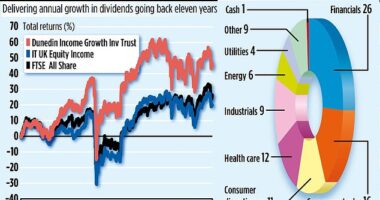
If any of your money is in corporate or Government bonds, you’ve had more than just an annus horribilis. Figures from Bloomberg suggest you’ve just endured the biggest bond crash in 150 years, including three consecutive calendar years of negative growth.
The fall in bond prices has been a horrible shock for those investors who traditionally use these bonds as a stabilising force within their portfolios such as those profiled below. They are nursing unexpected losses on funds they believed to be almost risk-free.
Yet what goes down often comes back up, and many financial experts believe that now is the time to build a portfolio of well-priced bonds with relatively high yields.
‘Bonds are looking more attractive now than they have in the last 15 years,’ says Andrew Prosser, head of investments at exchange traded funds platform Investengine. Sam Benstead, bonds specialist at DIY platform Interactive Investor, agrees. ‘Due to the rise in interest rates, the bond market finally offers a genuine alternative to stocks,’ he says.
Interest rates have shot up since December 2021. When that happens, bond prices tend to fall as the new bonds issued are likely to have higher yields. Investors sell existing bonds with lower yields to buy better deals from newly-issued debt. Bonds also suffer when inflation rises, as the fixed income they deliver becomes less valuable.


Taking off?: These investments require understanding and are not for the faint-hearted, so make sure you do your homework first
Now, bond prices are on the floor, inflation has stabilised, and yields are higher than the return you can get from your savings account. It appears to be the perfect time to take the plunge with a bond portfolio. But these investments require understanding and are not for the faint-hearted, so make sure you do your homework first.
Prices may rise soon
The reason why bonds have had such a torrid time of late is the sharp rise in interest rates across the globe in the past two years. In a bid to rein in runaway inflation, the Bank of England has hiked the base rate 14 times since December 2021, when the cost of borrowing stood at a record low of 0.1 per cent, to reach its current level of 5.25 per cent.
But the aggressive run of hikes came to a halt in September with the Bank holding interest rates steady. It backed another pause on rates a fortnight ago. Many believe we are now near the peak, with widespread forecasts that the Bank will start to reduce interest rates in the latter half of next year.
James Carthew, head of investment companies at QuotedData, says that if this is the case then bond prices will rise, which is good news for those who get in now.
‘If you feel strongly that interest rates are going to fall from here – even if that process does not start for a while yet – you would want to hold longer-dated bonds,’ he says.
Bonds, whether issued by a company or a government, are a way for entities to borrow money. In return for you lending them the money, they pay you a fixed regular payment known as a ‘coupon’, and then promise to pay back what they have borrowed from you at a fixed date, known as the ‘maturity date’. That gives you more certainty over payments than if you bought shares in a company, though there is still a risk that the issuer will go bust and default on the debt – in which case you won’t get all your cash back.
As well as the price and the yield on a bond, you will want to look at its duration – the length of time until it is paid back. The longer the duration, the more sensitive it is to changes in interest rates, because more of the value left in a longer-term bond is coming from the interest it will pay. So the price of a bond with ten years to go will fall harder than a bond with two years to go if interest rates rise. However, if you want to hold a bond to maturity and you think rates will fall over a long time, a longer-dated bond will lock in a high return for longer.
The funds to pick
Given the complexity of buying and selling bonds, many people opt for a specialist bond fund, which leaves the issues of duration and pricing to the experts.
If you have particular views on the direction of interest rates you can opt for a shorter or longer-dated bond fund, while those looking for the cheapest exposure could pick a passive tracker fund that moves in line with the price of a basket of bonds, for example, UK gilts.
For short-duration bonds, Prosser, at Investengine, suggests the Invesco UK Gilt 1-5 Year UCITS ETF, which costs only 0.06 per cent, has a duration of two years, and is yielding almost 4.5 per cent.
Those wanting a mix of durations could consider Invesco Bond Income Plus, recommended by Carthew at QuotedData, which has a yield of around 7.2 per cent and returned 6.4 per cent last year.
Jason Hollands, at BestInvest, suggests mixing your funds. Given that Government bond yields are attractive, he suggests having 60 to 70 per cent of your bond allocation in Government bonds and a third in corporate bonds. ‘Investors can achieve this mix through blending Government bond funds like the iShares Core UK Gilts UCITS ETF or Vanguard UK Government Bond Index fund, with corporate bond funds like Artemis Corporate Bond and the TwentyFour Corporate Bond fund,’ he says.
Rob Burgeman, senior investment manager at wealth management business Brewin Dolphin, likes Jupiter Strategic Bond and Man GLG Sterling Corporate Bond funds, which have yields of 4.75 per cent and 7.59 per cent, respectively. ‘They are solid, standard corporate bond funds,’ he says.
All that glitters
An alternative to bond funds is to invest directly in UK Government bonds – known as gilts – through the Government’s Debt Management Office. The safest bonds are those issued by stable governments. UK gilts are an example of this, and so are US Treasuries.
Gilts can be a tax efficient way of putting your savings to work. Any capital gain you make on gilts – the earning you make if the price is higher when you sell – is tax free.
Benstead, of Interactive Investor, says gilt issues TN24 and TN25 are selling for cheaper than their face value and are therefore attractive to investors who have used up their Isa allowance.
Existing bondholders
What of those who are nursing losses in a current bond portfolio? It can be hard to hear, but the main advice is to hold tight. If interest rates fall, bond prices will improve. James Norton, head of financial planners for tracker fund business Vanguard, says that although markets may remain volatile for a while, the expected return on bonds has increased from around 1 per cent to between 4 and 5 per cent. However, it may take some time for these yields to filter through.
‘That’s good news for lower risk investors,’ he says.
This post first appeared on Dailymail.co.uk








